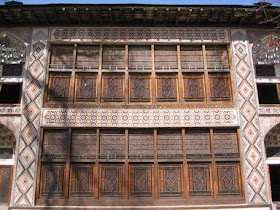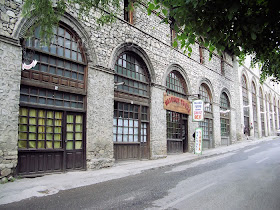The Palace of Shaki Khans (Azerbaijani: Şəki xanlarının sarayı) in Shaki, Azerbaijan was a summer residence of Shaki Khans. It features decorative tiles, fountains and several stained-glass windows. The exterior is decorated with dark blue, turquoise and ochre tiles in geometric patterns and the murals were coloured with tempera and are inspired by the works of Nizami Ganjavi.
Along with its pool and plane trees, the summer residence is the only remaining structure from the larger palatial complex inside the Sheki Khans' Fortress, which once included a winter palace, residences for the Khan's family and servants' quarters. It was built in 1797 by Muhammed Hasan Khan and restored between 1952 and 1967 by a team lead of architects led by Niyazi Rzayev.
Measuring thirty-two meters by eight and a half meters on the exterior, the summer residence is a two-story masonry structure elongated on the north-south axis and covered with a wooden hipped roof with long eaves. The layout of both floors is identical; three rectangular rooms are placed in a row, separated by narrow, south-facing iwans that provide access to the rooms. The floors are accessed separately to accommodate their public and private functions. Entered from the south through the two iwans, the ground floor was used primarily by clerks and petitioners. Two stairways attached to the northern façade gave access to the first floor, which was reserved for the khan's family and their guests.
The summer residence is renowned for the lavish decoration of its exterior and interior. Large portions of the residence's façade, including the entire southern elevations of the central halls on both floors, are covered by a mosaic of colored glass set in a wooden latticework (shebeke) that was assembled without nails or glue. Muqarnas hoods crowning the four iwans are highlighted with gold on the lower level and covered with mirror fragments on the first floor. Remaining surfaces on all façades are decorated with floral tile panels and tile mosaics.
The interior walls of the residence are covered entirely with frescoes painted at different times during the eighteenth century. Many of the frescoes feature flowers in vases, while a series of paintings on the first floor halls depict hunting and battle scenes. Signatures on frescoes list the names of artists Ali Kuli, Kurban Kuli and Mizra Jafar from Shemaha, Usta Gambar from Shusha, and Abbas Kuli, who may also have been the architect of the summer residence.
Piti is a soup in cuisines of Caucasus and Central Asia prepared in the oven in individual crocks with a glazed interior (called piti in Turkic languages). It is made with mutton and vegetables (tomatoes, potatoes, chickpeas), infused with saffron water to add flavour and colour, and cooked in a sealed crock . Piti is served in the crock, usually accompanied by an additional plate for "disassembling" the meat and the liquid part with vegetables, which may be eaten separately as the first (soup with vegs) and second (meat) course meal.
Piti is particularly popular in Azerbaijan, Iran (where it is mostly called Dizi or Abgusht), Tajikistan, and Armenia (where it is called putuk from the Armenian word for crock).
Bakhtiyar Vahabzadeh (Azerbaijani: Bəxtiyar Vahabzadə; August 16, 1925 – February 13, 2009) was an Azerbaijani poet. Born in Nukha, he moved to Baku in 1934 and studied philology at Azerbaijan State University (1947). He became an assistant at the same department and completed his doctorate with his thesis on the famous Azerbaijani poet Samed Vurgun. Until his death, he worked at the same university as a professor of “Contemporary Azerbaijani Literature” and as a deputy at the parliament of Azerbaijan.
He was recognized in Turkey with his article titled Yel Kaya'dan Ne Aparır? (What Does the Wind Steal from the Stone?), which was published in Varlık and which was an answer to the critics of the poet Fuzûlî. His articles and poems also appeared in the review Türk Edebiyatı for years. Besides poetry, Vahabzade also wrote long verses or stories in verse (poems), plays and made translations. Among his long verses, there is the Yollar-Oğullar (Roads-Sons) which was dedicated to the Algerian Independence Movement, and the Mugam, which was dedicated to the composer Üzeyir Hacıbeyli. He wrote numerous lyrics, most of which were set to music and wrote plays such as İkinci Ses (The Second Sound), Yağışdan Sonra (After the Rain), Artığ Adam (Waste Man) and Vicdan (Conscience). He translated the work titled Abidon Felini by Lord Byron into Azerbaijani. His poems have been translated into many languages in the Soviet Union as well as into many Turkic languages and into German, French and Persian. He received the Commodore Medal of the Romania Ministry of Culture in 2002 with his poetry book titled Benim Garibim (My Poor). He has been regarded as the second greatest contemporary poet of Azerbaijan, after Samed Vurgun. He was awarded with Istiglal Order for his contributions to national independence movement of Azerbaijan by President of Azerbaijan Heydar Aliyev on April 15, 1995. Vahabzadeh died aged 83 on February 13, 2009 in Baku.



































































No comments:
Post a Comment